- Home
- Bonnye Matthews
Zamimolo’s Story, 50,000 BC Page 5
Zamimolo’s Story, 50,000 BC Read online
Page 5
He held her down. “Stop struggling. You’ve been very sick. You need rest.”
“Where is Zamimolo?” she asked near panic.
“Who is Zamimolo?”
“He is the man I will join. Where is he?”
Mechalu thought carefully. Should he bring it all up? Would it help her get better to face reality so soon again?
“I don’t know where he is,” he answered truthfully. “You have been very sick. When you are better, I’ll take you to my people.”
“I don’t want to be separated from my People,” she sobbed, reaching for the little bag at her neck. It wasn’t there.
“What did you do with my little bag?”
“What bag?”
“The one that hangs on a leather strip around my neck. It’s missing.”
“You must have lost it in the forest. I haven’t seen it.”
Olomaru-mia felt something like a memory rising and it fell flat, irretrievable. She was so tired. Mechalu brought some branches over to her and laid a soft piece of leather over them so she could rise up a little. She watched him with the animal he was cooking and fell back to sleep. A while later she reawakened.
In a growl she demanded, “Get these things off my hands!”
He came over and realized she’d lost the fear he’d carefully instilled in her. He kneeled at her side. “No,” he said forcefully, staring hard directly into her eyes threateningly.
“Why?” she demanded not cowed.
“I put them there for a reason. They will stay there until that reason no longer exists.”
“At least have the courage to tell me why you did such a thing.”
“No!” he said emphatically. He went to her and took the small rope and with purpose and staring into her face, he tied her feet together. “It isn’t a matter of courage,” he muttered.
A shock went through Olomaru-mia, a memory tried to surface, but she could not quite grasp it. With her hands wrapped, there was no way she could untie the rope that tied her feet together.
“Am I a captive?” she asked, her voice tinged with horror.
“You could say so,” Mechalu replied.
Olomaru-mia tried hard to capture the memory, but it remained outside her grasp. She was silent. She knew she was a captive. She would think on that. It was, however, hard to think. She was so tired.
Finally, she rose up on an elbow and asked, “If I’m a captive, why did you take care of me when I was sick. Why didn’t you leave me to die and go your way?”
“You are not well yet. I didn’t leave you because I will take you to my people. There you will join with me.”
“I will not. I am promised to Zamimolo.”
“Zamimolo is lost. You are coming with me. I cannot leave you in the forest alone. An animal would kill you to eat you.”
“That would be fine with me.”
“Not with me.”
“Who are you?”
“My name is Mechalu, Olomaru-mia.”
Again, the memory came so close only to fade away.
“I really want to go home,” she whimpered.
“Olomaru-mia, your people have moved, and I have no idea where they are now. Hear me. You are going to come with me to my people. You will be my wife. I will take good care of you. You will not be harmed. You will be loved. Stop whining over what was lost and get used to what will be.”
Olomaru-mia stared at him. She understood what he was saying. She just couldn’t put the pieces of the recent past together. This stranger planned to be her husband and told her Zamimolo and her people were nowhere to be found. She wondered whether they’d taken a boat back to the home they’d left for this new land. She was so very confused and the bug noise was not helping her to feel better or think straight.
Mechalu took some of the meat that had cooked thoroughly on the outside and sliced it, laying the pieces on a slab of wood. He walked over to the bed where Olomaru-mia lay and sat beside her. He handed her a piece of the meat.
Olomaru-mia took it and ate. It was wonderful, she thought. She became full very fast but enjoyed the meat. She thanked Mechalu and dozed. As night came on, Mechalu got a large skin and stretched out beside Olomaru-mia. She awakened and asked him what he was doing.
“I am sleeping here on my bed beside you as I have for the last six nights. Lie back, be still, and sleep.”
Olomaru-mia was shocked to think that she’d been sleeping beside this stranger. She wanted to remain awake all night, but she could not manage to stay awake for any length of time at all. Soon she slept.
In the morning she awakened beside Mechalu. The memory came again and Olomaru-mia remembered that Mechalu had stolen her. She remembered Zamimolo calling to her from the mountaintop. Mechalu had made her unconscious, even though she couldn’t reply with a gag on. She remembered wanting to die. Mechalu had taken good care of her she admitted to herself. Off and on while sick, she saw that. Even with her death wish, he wouldn’t let her die. Her emotions ripped apart. She didn’t know what to think or feel anymore. She didn’t move for fear of awakening Mechalu. She reasoned that what Mechalu said was true: her People had probably moved from fear that another would be stolen, and Zamimolo was probably lost in the forest with another hunter, probably Linpint. They would surely find their way back to the People since hunters were trained to do that.
When Mechalu awakened, he realized Olomaru-mia was awake. He untied her feet so she was free to leave the area to make water. She probably wouldn’t run, he thought, because she clearly had no idea where she was and the forest sounds frightened her. In time she’d learn to interpret those noises, but he was glad that time was not yet. He reheated the meat and sliced it. He brought her some.
“Mechalu,” she said, “I really wish you’d let me die. I really wanted to die. If I cannot have Zamimolo and be with my People, I would rather die.”
He laid down the wooden slab where he’d put the meat for their morning meal. He held her shoulders very tightly and looked into her green eyes. “That is a very ungracious thing to say. The Creator made you to live. He has made it so that what you thought your life would be has changed. The expectation is that you will make the best of what is, not wish to die. For you to wish to die is ungracious to the Creator and to me. I will take care of you. You will have my children. They cannot be born without you. I do not wish to hear any more of your complaints. What is—is!”
Olomaru-mia was shocked. His people had a Creator. That Creator must be very like Wisdom. Was she being ungracious to Wisdom? Wisdom had, after all, allowed this to happen. At that moment Olomaru-mia lost her fight. She attributed her state to the winds of change, the exhalation of Wisdom that turned lives of the People upside down and caused much consternation. Zamimolo and her People were gone to her. She realized she depended on Mechalu to keep her safe and feed her, neither of which could she do. It was clear that he’d do all he could to keep her from death. She didn’t want to recognize that dependency, but it was real. She knew that she was going to have to change herself into someone new. Mechalu handed her some meat. She took it and thanked him. She ate.
Olomaru-mia looked up. “Mechalu, you have hit my head and made me sleep too much. If you continue to do that you will disorder my mind web, and I’ll be no use to me, you, or anyone else. Have you not seen people who have head injuries?”
“I think it’s safe to assure you now that no longer will I make you sleep. At the same time, you are to stop fighting, and you must obey me. You will not try to escape or remain silent about injury. In addition, this you must swear—if you hear your name called by those who search for you, you will not respond. If you do reply to a call, my hunters and I will track down the callers. You will watch us skin them slowly for three days while they are tied to the ground, kill them, and know you are responsible. These are our forests. We can find them, while they cannot find us. Do you swear?”
Olomaru-mia was horrified. They’d skin living People! Who could think of such an awful thing to d
o? It was outrageous. It spoke of a sick mind web. What manner of people were they? she wondered. Nausea tinged the edges of her belly. “In the face of Wisdom, I will swear,” she said in a very subdued voice.
After some time Mechalu asked, “Is there anything I can get for you?”
“A comb,” she replied having earlier noticed that there were many tangles in her hair.
“What’s that?” he asked not familiar with the word.
Olomaru-mia explained the word and the use for it. She drew a picture in the dirt. Mechalu understood but told her they didn’t have combs but that he would try to make one for her. He told her they cut their hair, but he didn’t want hers cut. He thought her hair was beautiful just like it was.
Mechalu pushed her down and told her to sleep. Soon, he knew, they needed to continue their trek home. She needed to regain strength to make that trek. He got a piece of hard wood and brought it to sit near her. He began to carve a comb. It would have more spaces than the one she had used, but it would work.
Suddenly the forest became uncharacteristically quiet. Olomaru-mia sat upright. A rumbling noise was followed by great waves in the earth, as if they were on the ocean. It continued for some time. Trees swayed back and forth and a rock fell from the overhead shelter. Then there was silence. All became still.
Olomaru-mia was surprised but not frightened. She’d experienced earthquakes in her life, not this large, perhaps, but some did quite a lot of damage. She waited to discover whether others would follow. Mechalu pushed her back down and told her again to sleep. He explained that earthquakes were very common in this land. Sometimes they’d cause a dwelling to fall, but normally they did no damage at all.
Olomaru-mia knew from Ki’ti’s Understanding, a story told at campfires about the reason for the winds of change when Mt. Baambas erupted. It told that the winds of change were always for good purpose, even when the People could not detect the reason. She tried to find a good purpose for her capture, but she could find no reason for what happened to her. She thought on Mechalu’s words, “What is—is.” It did not take long before she closed her eyes and drifted off to sleep, Olomaru-mia wondered as she did just who she was. She was no longer certain she knew her own identity.
Chapter 2
Linpint stood on the white beach sand and inhaled deeply the salt air. It was another gray day. He wondered when the sun and blue sky would return. He loved the appearance of the blue green water. This new sea on the other side of the narrow land where they had decided to make their new home came as a real surprise. He walked to the water’s edge. After the storm they’d witnessed the night before, he wondered whether there would be objects washed up near the shore. He was not disappointed. His brief walk at the edges of the water showed several shells shaped like snail shells but huge and obviously from animals that lived under the water. He picked up two of them and realized the animals were still inside the shells but had pulled a piece of hard substance across the entryway to protect themselves. With his fingernail he tapped on the protective shield of the animal. The tap on the protective shield, unlike skin of the animal, made noise. He carried them back to the place where the two men spent the night.
“What have you brought?” Zamimolo asked.
“It looks like two sea snails,” Linpint replied holding up his treasures that were twice as long as his hand. “We eat fresh food from the sea this day.”
Zamimolo went to the sea and partly filled a large leather bag with seawater. He picked up some green seaweed, swished it in the sea, and dumped it into the bag. He hung the bag on a nearby broken tree limb and, using tongs made from bent wood, he added several fist-sized stones from the edge of the fire to the bag. Soon they’d eat. Already he was salivating.
Linpint took the time to run a comb through his hair. He pulled it back and fastened his hair at the top back of his head with a collar held together with a wooden pin that went through the three holes of the leather. It worked well to keep his hair from his eyes. Zamimolo had chosen the same means of controlling his hair. Some men wore theirs loose or cut. There was no one way to fix hair, though not too long ago all grown men would have had long loose hair unless they hunted and then they’d use a single braid down the back. The young men would have had hair cut shoulder length, held in place with a band around the forehead to the back of the head, until they made their first large kill.
“As big as those things are, I think we should add some more hot rocks,” Zamimolo said.
“Good idea,” Linpint replied. He got up, removed the rocks from the bag, and added several others that were white hot. The water immediately boiled.
Zamimolo had pulled two pieces of woody material from a palm tree and put it beside the bag to receive the shells.
“It has to be ready,” Linpint said as the savor of the meat wafted on the salt air. He put a shell on each of the servers Zamimolo had found. The animals inside the shells had erupted from them. To the servers Linpint added equal parts of the seaweed. “Hot food and a lovely place to eat it. This is tasty!” he exclaimed with sincerity.
“I wouldn’t mind eating jerky and being back at the place with all People present,” Zamimolo said acerbically.
Linpint couldn’t help but notice how bitter Zamimolo was becoming from the abduction of Olomaru-mia. He knew bitterness would do his friend no good, but didn’t know how to help. Zamimolo rebuffed his suggestions each time Linpint offered, so Linpint kept silent. In his own case, he knew the outcome of the loss of a wife. Her body lay in the sea. She fell overboard on the trip to the new land. He had no hope. Zamimolo did, but the Wise One had effectively quashed it. He tried to remain sympathetic without encouraging the bitterness.
Zamimolo poured the remains of the cooking bag water on the fire, tied the bag to his backpack, covered the fire pit with sand, and gathered his few things together. He stood looking out at the sea wondering again where Olomaru-mia was. He was eager to follow the path that led along the edge of the water. Linpint shrugged on his backpack and was ready.
The two men left their temporary residence and headed along the path with the sea on their right side. They searched each time they reached a high point for traces of hearth fires, but saw none. For days they traveled, always with the sea on their right. Occasionally they’d see very small islands off to the right. Infrequently they’d see a small fire pit that had been used moons ago.
Linpint marveled at the parrots, for he’d never seen birds like these. A pair took wing as they approached, showing their brilliant red underwings and underbellies. Both men were becoming accustomed to the raucous noise of the birds and monkeys, but they still lacked understanding of the signals their sounds provided.
Zamimolo’s belly continued to be ripped apart with the loss of Olomaru-mia. “If I ever find the man who took her,” he said with half chewed peccary in his mouth one evening, “I’ve resolved to kill him. I dream of killing him.”
Linpint was alarmed. To hunt to find Olomaru-mia was one thing; to hunt to kill a man, quite another. The latter was vengeance. The stories made it clear that vengeance was a killer of those who used it. It was not in keeping with the order of the winds of change, something to which Wisdom expected the People to adjust.
“Zami, you are ignoring the story of Gambul and Mangot. I fear for the health of your mind web, if you continue these thoughts.” Linpint was horrified. He didn’t like what was happening to his friend at all, but he had no sense of how to reach him. From Zamimolo’s scowl it was clear that his words had a very different effect from what he had intended.
“Nobody who listens to those stories has any idea how I feel!” Zamimolo spat out the words, his hands clenched tightly and his jaw muscles bulged.
“So you think you’re the only person who has lost the love of his life?”
“I’m sorry,” Zamimolo looked at Linpint with softer eyes. “I know you still grieve. What I just said is self-centered and unkind. I am just so undone.” His hands relaxed but the muscles in his ja
w did not.
“Zami, if you continue on with the desire for vengeance, I will leave you to return to the People. You are my friend, but I will not watch you destroy yourself. It’s not as if you don’t know better. You would be searching for the wrong thing for all the wrong reasons. I will not choose to help with that.”
Zamimolo listened to Linpint. His friend had been saying these words in different ways for many days. He knew the truth of the words. He heard them with his ears but they never got deep enough to affect his belly, the source of his fire of vengeance. He knew Linpint was his friend—all a friend could be. Linpint’s words would throw water on the fire that was building in his belly, Zamimolo admitted, but the water was not enough to extinguish the fire.
Zamimolo resolved at least to keep the fire banked. By hiding the embers, he hoped to have his friend beside him for the seasons promised. He didn’t wish to be alone. Maybe, he thought, he could get past these vengeful feelings.
“You’re right. Thank you, Linpint. I have hated the man instead of what he did. I have seen the man for what he did rather than who he is. There is, perhaps, a difference. I will correct my mind web as we walk today,” he said, wondering whether he might actually be able to do what his words said. Both men climbed into trees near the water to prepare for sleep.
The next day the two were nearing the summit of a great bald hill, when Linpint exclaimed, “There in the far distance is a fire!”
Zamimolo rushed over to see where Linpint pointed. Sure enough, smoke was rising.
The two men moved as rapidly as they could to reach the fire. When they reached a small hill, they looked down on a fire. Near the fire, someone appeared to sleep. They walked down the hill quietly. A young man rose up and turned to face them.
“Who are you?” he asked them, in words close enough to theirs for them to understand.
“I am Linpint. This is Zamimolo.”
“I am Tomarghi of the Kapotonok. I ran from a big-tooth cat in the forest. I have injured my leg. The big-tooth cat left when I made it into the sea. I came for the turtle eggs. The turtles should arrive any night now.”

 The SealEaters, 20,000 BC
The SealEaters, 20,000 BC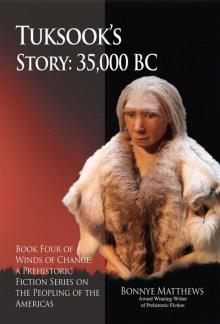 Tuksook's Story, 35,000 BC
Tuksook's Story, 35,000 BC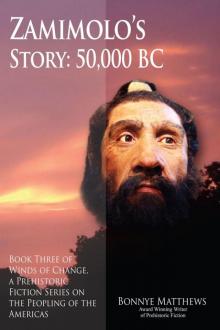 Zamimolo’s Story, 50,000 BC: Book Three of Winds of Change, a Prehistoric Fiction Series on the Peopling of the Americas (Winds of Change series 3)
Zamimolo’s Story, 50,000 BC: Book Three of Winds of Change, a Prehistoric Fiction Series on the Peopling of the Americas (Winds of Change series 3)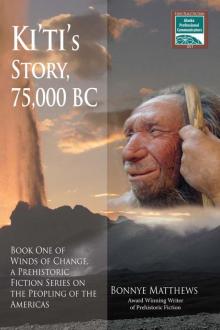 Ki'ti's Story, 75,000 BC
Ki'ti's Story, 75,000 BC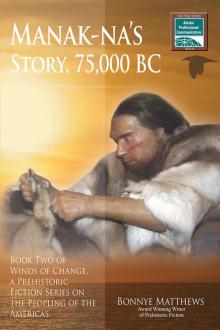 Manak-na's Story, 75,000 BC
Manak-na's Story, 75,000 BC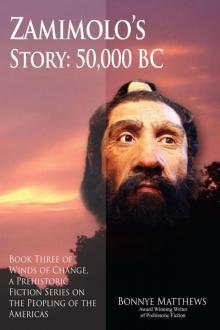 Zamimolo’s Story, 50,000 BC
Zamimolo’s Story, 50,000 BC